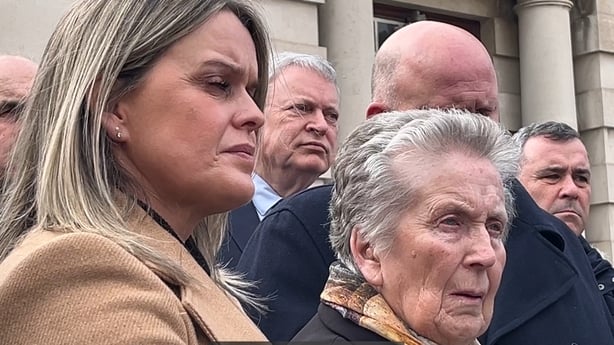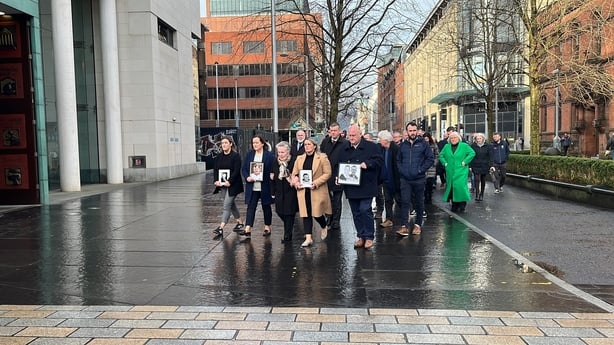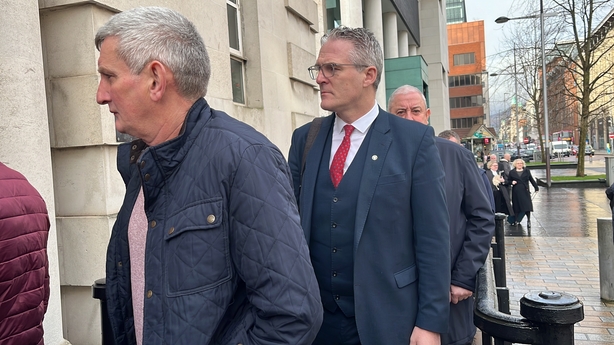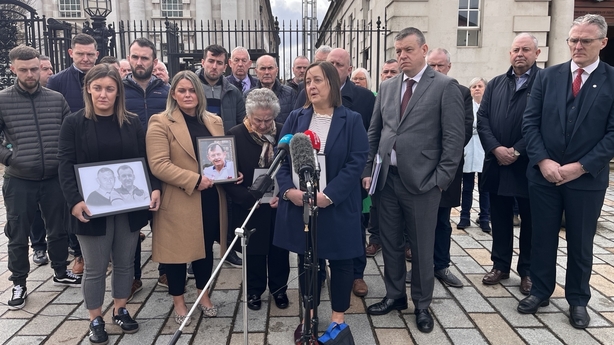A coroner is to write to Northern Ireland Secretary Chris Heaton-Harris calling for a public inquiry into the 1997 loyalist murder of senior GAA official Sean Brown.
Mr Justice Kinney said he expected Mr Heaton-Harris to make a decision within four weeks.
The coroner ruled that due to the extent of redactions required of sensitive intelligence material provided by police and military intelligence he could not hold a proper inquest.
Last week the family was informed that the intelligence material linked 25 people, including several state agents, or informers, to the murder.
The coroner said given the redactions, to go ahead with the inquest would result in an investigation which would be "incomplete, inadequate and misleading".
The coroner said the material contained information relevant to the investigation but could not be disclosed on the grounds of national security.

The PSNI, the UK's Ministry of Defence, and the British security services had all made applications asking for intelligence material to be withheld.
Counsel for the family, Des Fahy KC, said the truth of what happened to the 61-year-old was in the heavily redacted security files.
He said it could come out if the state authorities allowed it.
There was an obvious question, he said, "what do those state parties have to hide?"
A public inquiry would allow the consideration of intelligence material in closed session, something a coroner's inquest cannot do.
The inquest hearing was to rule on whether that intelligence material could be shared with the legal representatives of the family.

The case had been scheduled to run for four weeks, providing enough time to conclude it ahead of the guillotine date of 1 May 2024, after which all Troubles inquests will end under the UK government's controversial legacy act.
Any outstanding inquests would be moved into a truth recovery body established by that legislation, the Independent Commission for Information Recovery and Reconciliation.
Mr Brown was abducted as he locked the gates of Bellaghy Wolfe Tones GAA club in Co Derry, in May 1997.
He was bundled into his own car, driven a distance of around 16km, and shot dead close to the village of Randalstown in Co Antrim.
His vehicle was set alight and when police arrived they found Mr Brown's body beside the burning vehicle.
Nobody has been convicted of his murder.
PSNI Chief Constable Jon Boutcher said he acknowledged "the pain and suffering" that the family of Seán Brown "continue to feel" as they seek answers.
"I am determined to work with those families impacted by the disclosure limitations of the coronial process. The Brown family, and indeed others, have been let down by the lack of a suitable mechanism to address sensitive information at inquests," he said.
Mr Boutcher added: "As we know, inquests can work perfectly well for some families, but for those cases where large swathes of information attract Public Interest Immunity, those families also have a right to answers. I am looking to address those issues and the Police Service of Northern Ireland will cooperate with any public inquiry."
The public gallery in Belfast High Court was packed with members of the Brown family and supporters, including senior GAA officials, among them GAA President Jarlath Burns.

In a statement, the GAA said it was "disappointed that the failure of British security forces to release
material relating to the murder of former Bellaghy chairperson Seán Brown means an inquest cannot proceed".
However, it said it welcomed the call from the coroner for a full public inquiry.
"The Association acknowledges the work and diligence of the coroner and will continue to assist and support the Brown family in their quest for full disclosure, truth and justice after a 27-year wait," the statement added.
The family has been trying to complete an inquest into his death for many years but have faced repeated delays.
It finally began in March 2023 and moved into a process of legal discovery.
That became bogged down when it emerged that a large quantity of sensitive intelligence material relating to the murder was in police and security service files.
Lawyers for the family have been trying to have that material made available to them, but there have been challenges from the police and MI5 on the grounds of national security.
In one folder of intelligence documentation there are 56 pages, all of which are completely blacked out.
Last November, the PSNI wrote to the coroner to say that due to the sensitivity of the material it could not co-operate with the inquest and that it was not an appropriate vehicle to fully investigate the murder as inquests cannot hold closed hearings to consider intelligence material.
The PSNI said it would not object to the holding of a public inquiry, which does have such powers.
In January this year a hearing was told that a suspect in the murder was a serving member of the Royal Irish Regiment.
If there is to be a public inquiry that would be a decision for Mr Heaton-Harris.
He has said he will consider the judgment of the coroner once it is delivered.
A number of Troubles-era inquests have folded in recent weeks when it became apparent that they could not be concluded before the UK's government's cut-off.
Sean Brown's daughter Siobhán called on the Irish Government "to throw their support behind the family as well, and that they would also recommend a public inquiry going forward.

"So it now lies in the hands of the Secretary of State and the approach that he takes in relation to that.
"We had snippets of information all along, it was always the family's opinion that there was state agents involved in it.
"The extent to which they were involved was shocking. When we heard last week, that up to 25 individuals were involved - many state agents.
"The information in relation to the surveillance on an individual that was carried out, stopped and restarted the day after my father was murdered - that all speaks volumes", she said.
We need your consent to load this rte-player contentWe use rte-player to manage extra content that can set cookies on your device and collect data about your activity. Please review their details and accept them to load the content.Manage Preferences
Speaking on RTÉ's News At One, Ms Brown said the coroner's decision did not come as a great shock and they always believed there had been "state collusion" and a cover-up in her father’s murder.
"Everyone was treated the same, and he did not follow any political parties. He just went about doing his own job. He was a great family man. GAA was his life as well."
Last March the inquest started but she said it had been a "long, slow process" to reach this point.
"I believe the amount of material that is within the files that is in the hands of the PSNI, the MOD, the security services, someone there knows something and due to the sheer volume of material that has been redacted; yes, there has to be information in there as to why Daddy lost his life and who carried out that murder," she added.






